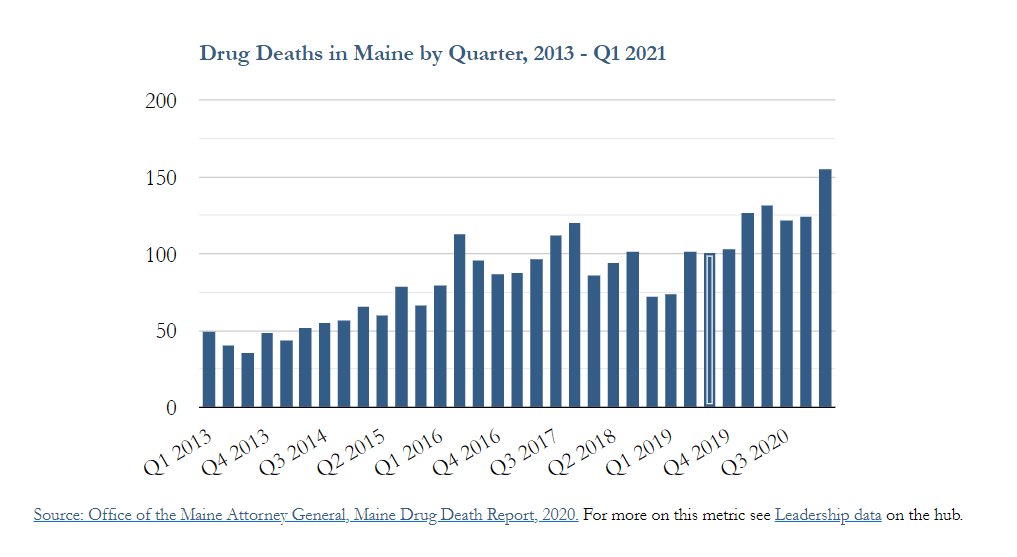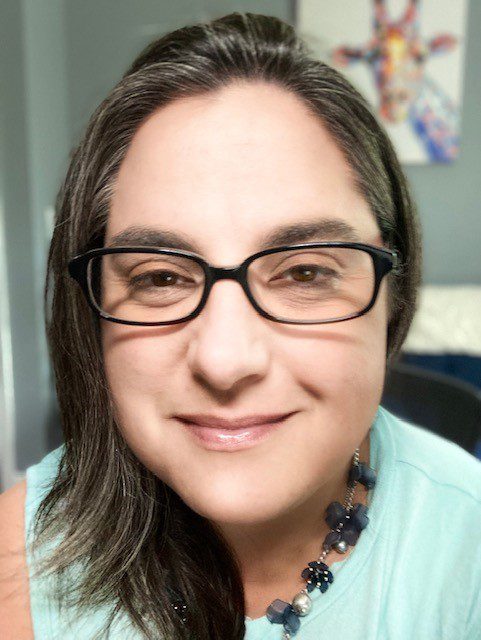Maine lost 18,000 years of life last year to opioid overdoses. That’s what Oliver Bradeen, executive director of Milestone Recovery in Portland, calculates based on average life expectancy and the ages of the 504 Mainers who died of an overdose in 2020.
“I don’t think we will eradicate COVID — I think it’s probably here to linger — but we’re going to be better at managing it,” Bradeen said. “We have not been able to manage this substance use crisis in our country. In fact, if you look at the data on use in general, it just kind of keeps going up.”

Over the past 18 months, as the coronavirus captured much of the public’s attention, another, older public health crisis continued to rage. Fatal overdoses in Maine reached a record high while increasing 33% in 2020.
The state Attorney General’s annual report on overdose deaths found that the increase in drug deaths last year was largely driven by fentanyl combined with other drugs, not by COVID-19 infections or an increase in suicidal overdoses.
However, experts from six prevention and recovery organizations said the pandemic increased isolation and created additional barriers to recovery — challenges that continue to grow as the pandemic wears on and Maine faces the possibility of a second locked-down winter.
This year is already on a worrying track. As of July, there have been more than 5,000 overdoses this year and 360 deaths.
And opioids aren’t the only concern. Experts said substance use in general is on the rise during the pandemic.
In response to rising substance use, Gov. Janet Mills last week dedicated $2.1 million in MaineCare funds to increase the reimbursement rate for residential substance use disorder treatment, allocated funding to continue a recovery program serving eight counties and extended an employment program for people impacted by the opioid crisis.
‘Miracles every day’
Scott Knowles, a recovery coach with Maine Recovery Core through Healthy Acadia, said separation from society is “one of the greatest symptoms of addiction.” The way to overcome that is by reconnecting with society. But that’s difficult when gatherings are prohibited and meetings are over Zoom.
“Recovery coaching is a tough proposition, especially during COVID, because it’s an uphill battle,” Knowles said. “The odds are not really in our favor. But that doesn’t mean that it’s not a tactic. We do make a difference.”
Knowles became a recovery coach after his own experience with substance use, which began when he was 11. He started with alcohol and marijuana but had moved to opiates two years later. By the time he was 13, he had racked up about 20 felonies and ended up in a coma at Eastern Maine Medical Center.
After a year in jail, Knowles stayed sober for four years. But when he was 18, Knowles was diagnosed with narcolepsy and was fired from three jobs for falling asleep at work.
“So I went back to doing what I knew how to do, which is selling drugs,” Knowles said. “I felt at that time like I didn’t have an option because I couldn’t get regular work.”
He continued using and selling drugs for a decade until being arrested at 30 on drug trafficking charges. Through drug court and his involvement in a 12-step program, Knowles learned about the benefits of recovery coaching. A friend recommended he train to be one himself.
Knowles has been with Maine Recovery Core for two years and is working on a degree from the mental health and human services program at Eastern Maine Community College. He celebrated three years of sobriety in August.
Punishing people for addiction disorders doesn’t work, Knowles said. It’s better to treat them.
“Listen, I see miracles every single day,” Knowles said. “Like addicts in recovery that should have been dead a long time ago, and now they’re out here making a difference helping other people.”
As a recovery coach, Knowles helps people connect with resources and also provides support by listening. It’s important for him to share his “experience, strength and hope” with people so they are hopeful they can do the same.
He said it’s heartbreaking and scary to see the number of Mainers who overdosed last year.

“I have to be able to let people know that this is possible because three years ago when I was sitting where they’re sitting now, I didn’t believe that it was,” he said.
Recovery coaches receive ongoing training and professional development, said Paige Johnston, the Maine Recovery Core program director. Coaches must have a connection to recovery but don’t necessarily need a history of substance use disorder.
Healthy Acadia received $300,000 from the state last week to continue the Maine Recovery Core program, which started as an Americorps program and formerly was called the Maine RecoveryCorps.
The program employs 10 recovery coaches who work in eight counties, and Johnston said Healthy Acadia plans to hire five more in October.
Substance use isn’t a new problem in Maine, but parts of the state still deal with “extreme stigma” around substance use and mental health, Johnston said.
“That makes it hard for people to get help they need,” she said. “And that can end up eventually killing people because they’re afraid to reach out, and then they overdose.”
Prevention not a ‘quick fix’
The 77% increase in MaineCare reimbursement rates for detoxification providers announced last week will help places like Milestone Recovery, which closed its detoxification center for three months this spring due to staffing shortages. (MaineCare is the state’s version of Medicaid, which provides assistance for Mainers with limited resources.)
Milestone is one of the two detox centers in the state that accepts MaineCare and people who are uninsured. The state’s previously low reimbursement rates made it difficult to pay a competitive wage to nurses and nursing assistants who could get paid more in a hospital, said Bradeen, the executive director.
Through the biennial budget, the state also allocated $110 million to support prevention, early intervention, harm reduction, all levels of treatment, crisis care and recovery assistance, according to a press release. The Mills administration said it has launched a program of liaisons in 14 counties, established a texting service to alert Maine residents of a sudden increase in overdoses near them and trained 530 new recovery coaches.

Malory Shaughnessy, executive director of the Maine Alliance for Addiction and Mental Health Services, said she appreciates the recent steps taken by the state but worries there’s not enough attention on broader substance use.
“We’re so focused on opioids like at one time we were so focused on crack, and we were so focused on heroin, or so focused on different substances, as opposed to being focused on addiction,” Shaughnessy said.
There’s too much focus on the “supply side” of substance use and not enough on the “demand side,” or the reasons people seek the substance in the first place, she said. The best way to reduce demand is to promote community activities that foster relationships among families and neighbors.
Shaughnessy said she wonders what difference it would make to have daily overdose data updates and regular press briefings from a public health official like the ones Dr. Nirav Shah, the Maine CDC director, has held on COVID-19.
“There’s a stigma that, ‘Well, people who got COVID, they didn’t do anything to get it, but people that died of a drug overdose, they sought that drug out,’ ” Shaughnessy said. “As opposed to saying somebody has a medical problem. They have a physiological addiction to something.”

In the long run, prevention is the cheapest and most effective approach to reducing substance use, but those efforts don’t receive much funding because it’s difficult to quantify the results, said Corrie Brown, substance misuse and tobacco prevention manager with Healthy Androscoggin.
Brown said her work focuses on prevention among young people, particularly alcohol, marijuana, prescription drugs, stimulants and opiates. Healthy Androscoggin conducts education programs in schools, coordinates free drug take-back days and teaches safe storage.
But prevention isn’t easy to describe and can take a long time to see results, she said.
“People like to see quick fixes and prevention is not a quick fix,” Brown said.
While it’s hard to tie increased substance use directly to the pandemic, Brown said the isolation and stress of the last 18 months and long wait lists for mental health treatment may be contributing factors. She’s worried about even more isolation in the coming winter.
But Brown said there’s a lot of good work at the community level that doesn’t always capture statewide attention.
“One of the good things that came out of COVID is that there’s really been a lot of talk around improving your mental health and connecting with people in different ways, and getting out and exercising or just being in nature,” Brown said. “And those are all things that prevent (substance) use.”
Knowles, the recovery coach, said there’s help for people who ask for it.
“Any addict can get better,” he said. “We just can’t do it alone.”







